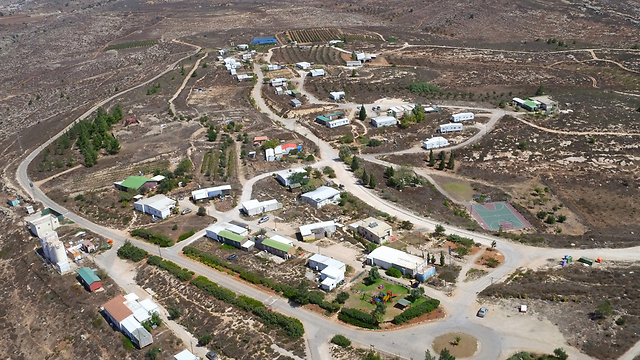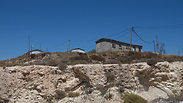
No point in evacuating Amona
Op-ed: From an ethical perspective, whoever petitions the High Court over outposts built on private land is helping legitimize settlements in the rest of the area; from a practical perspective, the greater the protest in the settlement sector, the larger the compensation that will be paid for evacuation by consent.
In December, the state is slated to evacuate and demolish the houses of Amona,
an outpost built on private Palestinian lands
near the settlement of Ofra. The demolition was decided by the High Court, after numerous delays.

The evacuation has stirred up the political system. Twenty-five of the 30 Likud faction members, including ministers and the Knesset speaker, have announced their objection to the evacuation. this despite the fact that they had previously signed off on the evacuation. Members of Bayit Yehudi are threatening to quit the coalition over the matter. Politicians and government workers are hunting high and low for a way to cancel the harsh verdict, a ‘High Court bypass’ law or the establishment of a community on alternative land.

Amona. Do not demolish and do not evacuate, but go to the High Court and admit you are powerless (Photo: Tomeriko).
If Amona is evacuated, right-wing officials say, up to 3,000 houses in settlements with a similar status will have to be evacuated, too. It will be the end of the world, like the destruction of the Temple. For that exact reason, the left-wing NGOs are rubbing their hands in expectation. Their efforts have been successful.
And I’m saying, don’t demolish and don’t evacuate. Go the High Court and admit: We are powerless.
There are two reasons why there is no point in an evacuation: an ethical reason and a practical one.
The ethical reason goes back 40 years, to the upheaval that led to the Likud’s rise to power. In 1978, the Menachem Begin government reached a secret agreement with the Gush Emunim movement on the establishment of six settlements in the West Bank, including Beit El, north of Ramallah. The land owners filed a petition with the High Court of Justice. The state was represented by Gabriel Bach and Dorit Beinisch, both future Supreme Court judges. They argued that the area was expropriated for military purpose. The panel of judges, chaired by Moshe Landau, struggled and deliberated and eventually approved the expropriation.
Begin responded with joy reserved for soccer fans after a goal has been scored. “There are judges in Jerusalem,” he announced. Contrary to what has been engraved in the public memory, Begin was not trying to glorify the court, he was trying to glorify his victory.
Since then, the High Court has dealt with hundreds of petitions pertaining the settlements. The military purposes claim was replaced with another claim—namely, that the lands are state-owned. Both claims were dubious at best or false at worst, but in most cases the High Court accepted them. The judges were mostly bothered by one question: Are the settlers’ homes situated on private Palestinian land? As Landau wrote in the Elon Moreh ruling: “The individual’s ownership right is an important legal value… Zionism insists on the Jewish people’s right of return to their land, but has never sought to deprive the land’s residents of their civil rights.”
The list of priorities of Supreme Court judges throughout the generations was clear: It’s okay to denounce international law, which forbids the transfer of a population to an occupied territory; it’s okay to denounce Israel’s governments of their official policy, which talks about the establishment of a Palestinian state in the West Bank and Gaza; it’s okay to denounce most Israelis of their desire to live in a Jewish and democratic state; it is okay to denounce the Palestinians of their future. But Muhammad’s right to hold on to a plot he will never be able to till or built on, a plot on paper, is something the High Court will insist on. It will be the last resort of justice, the last resort of the law.
This perception may be justified using legal and political terms. It’s harder to justify it from an ethical point of view. The problem does not just apply to judges. Whoever files a petition claiming that someone’s private property is being harmed is taking part in legitimizing the settlement in the rest of the area. That’s the nature of the game.
The evacuation of Amona is a bad thing from a practical point of view, as well. The greater the protest in the settlement sector, the larger the compensation that will be paid for evacuation by consent.
Like in the Migron affair, the government will create a new Amona, larger and more spacious than the existing Amona. The sector’s lobby won’t settle for that: It will demand the legitimization of other pirate outposts, perhaps all outposts, in the past, in the present and in the future; it will demand legislation that will allow the expropriation of private land; it will demand budgets.
In exchange, on evacuation day, it will provide the government with difficult images, of girls crying bitter tears over Torah scrolls, of boys screaming from rooftops, and the entire world will know that Israel is a law-abiding state: There are judges in Jerusalem.

















